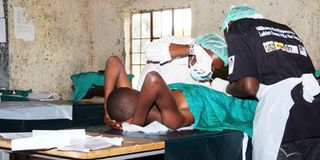Why male circumcision may soon become mandatory

Nurses carry out voluntary medical male circumcision procedures on students at Kiamaina Secondary School in Bahati, Nakuru County on November 16, 2014.
What you need to know:
- Mukurweini MP John Kaguchia says the move will significantly reduce the prevalence of STDs in the country.
- The World Health Organization now recommends circumcision as one of the ways to prevent HIV infection.
A draft Bill to be tabled in the National Assembly seeks to make male circumcision mandatory in the country, but under the supervision of trained medical personnel.
“Implementing mandatory male circumcision can lead to a significant reduction in the incidence of HIV, HPV and other STDs thereby lowering healthcare costs associated with their treatment and long term management. Moreover, a decline in STD prevalence contributes to a healthier workforce, improved productivity and enhanced societal well-being,” reads the draft Bill.
The Bill, proposed by Mukurweini MP John Kaguchia, says its adoption will significantly reduce the prevalence of sexually transmitted diseases (STDs) in the country.
"The introduction of mandatory medically supervised male circumcision between birth and 18 years of age will contribute significantly to a healthier, safer and more prosperous society for all," the Bill reads.
The Bill has two aspects - banning the traditional circumciser's knife and replacing it with a medically approved cut, and making it mandatory for all boys to undergo a cut, meaning that it moves the cut from a cultural practice to a public health requirement.
Circumcision status and practices are typically determined by culture, ethnicity and religion, and the move to make it a public health requirement rather than a cultural practice is likely to be met with resistance.
But Mr Kaguchia said it's only the cutting that is medically performed, after which the community can continue with traditional ceremonies, so the culture is maintained but in a medically approved arrangement.
"This is good for the boys because it moves circumcision from a cultural practice to a medical requirement for those who don't practice it as a cultural practice," Mr Kaguchia said.

Newly circumcised boys along the Webuye-Kitale road on August 26, 2020.
According to the Bill, since minors have been maimed in the past while undergoing circumcision as a traditional rite of passage in the absence of trained medical professionals, the presence under the new proposal will ensure that the procedure is carried out with strict standards of hygiene and care.
"It is proposed that males be circumcised between birth and the age of 18. Medical professionals will be able to assess individual cases and ensure that those with specific health concerns are treated with appropriate caution," the Bill reads.
Mr Kaguchia argues that sexually transmitted diseases are a public health threat, contributing to increased healthcare costs and loss of life.
The Centre for Disease Control and Prevention (CDC) has found that male circumcision reduces the risk of acquiring HIV through heterosexual intercourse by about 50-60 per cent.
According to a CDC report published in 2014, male circumcision can reduce a man's risk of acquiring HIV during heterosexual contact with HIV-infected women by 50 to 60 percent, based on data from three clinical trials.
Circumcised men have also been shown in clinical trials to be 42 per cent less likely than uncircumcised men to acquire new infections of syphilis, 48 per cent less likely to acquire new infections of genital ulcers, 28 to 45 per cent less likely to acquire new infections of genital herpes, and 24 to 47 per cent less likely to acquire new infections of high-risk strains of human papillomavirus associated with cancer.
While male circumcision has not been shown to reduce the risk of HIV transmission to female partners, it does reduce the risk of a female partner acquiring a new syphilis infection by 59 per cent. Observational studies have shown that circumcision reduces the risk of penile cancer, cervical cancer in female sexual partners and urinary tract infections in males.
The World Health Organization now recommends circumcision as one of the ways to prevent HIV infection. But circumcision does not protect men 100 per cent.
Doctors believe circumcision protects men because of specialised cells in the foreskin of the penis, which is removed during the procedure.
The foreskin is filled with immune cells called Langerhans cells, which are sentinels of the immune system and easily attach to viruses, including HIV.





